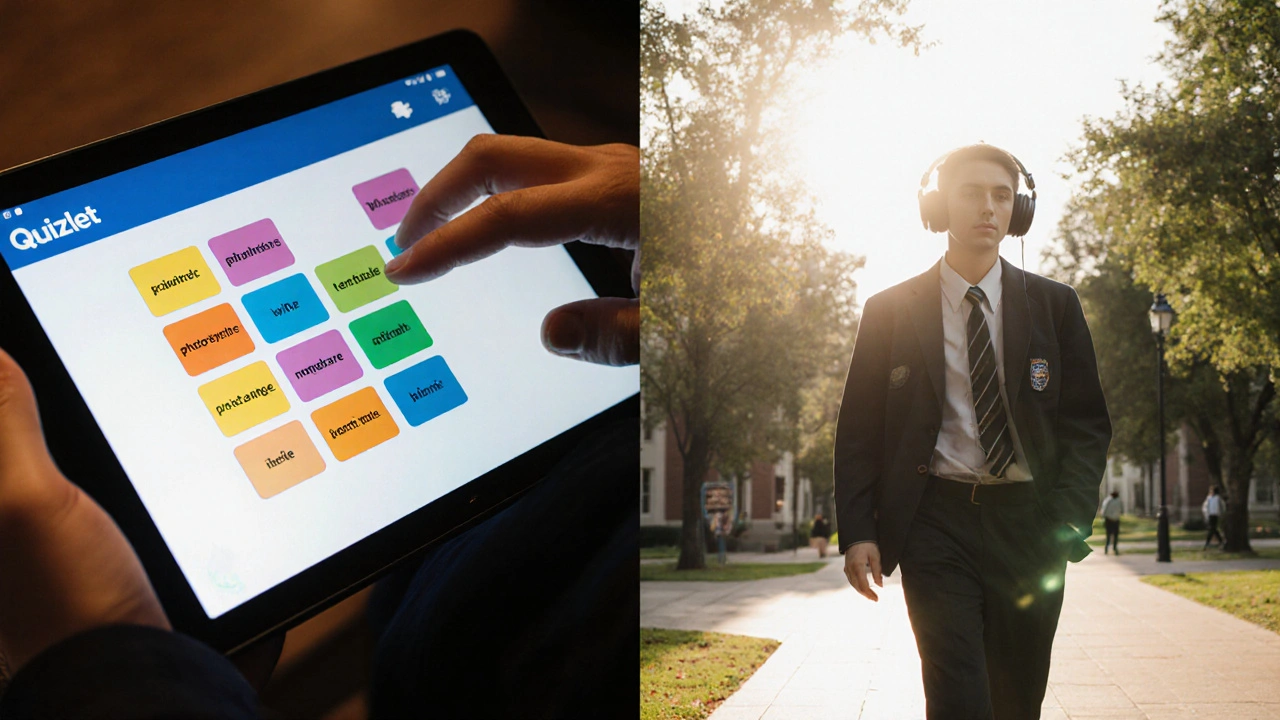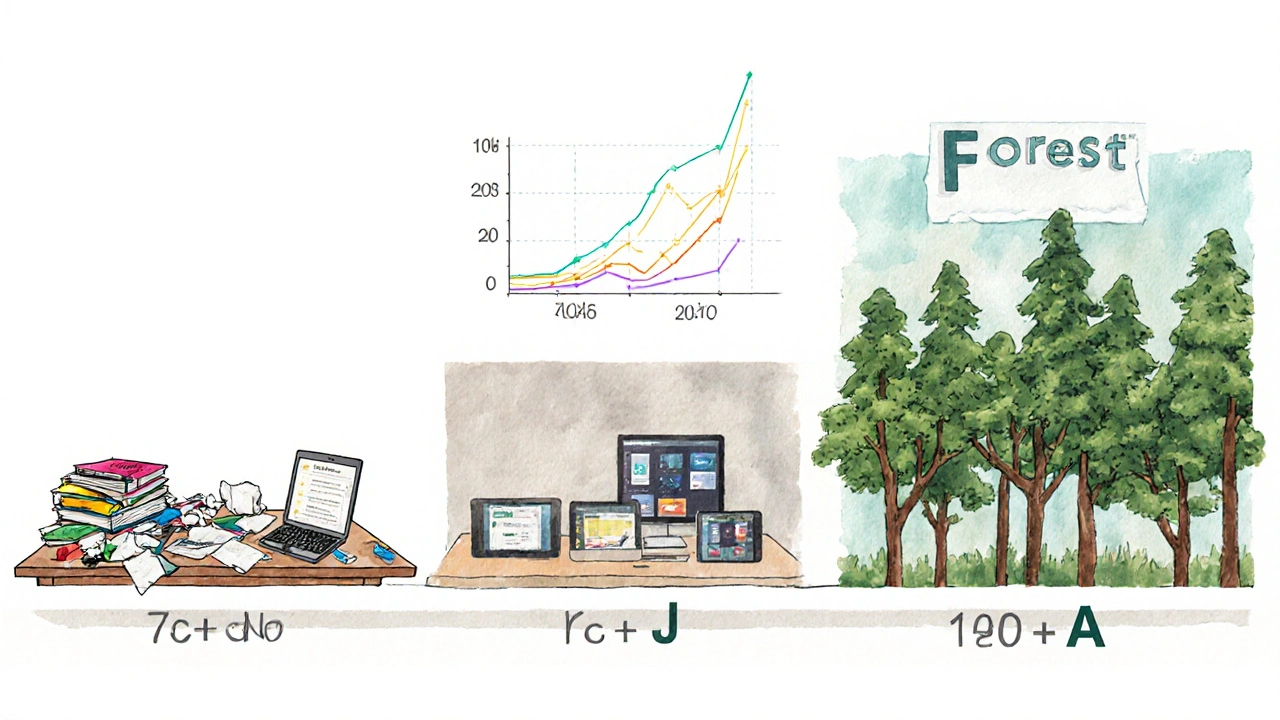
Studying for exams shouldn’t feel like re-reading the same textbook five times until your eyes glaze over. If you’re still using highlighters and paper flashcards, you’re leaving real performance gains on the table. The right digital tools don’t just make studying easier-they change how your brain remembers things. And it’s not about using more apps. It’s about using the right ones the right way.
Why Most Students Fail at Revision (And How to Fix It)
Let’s be honest: most students don’t fail because they’re lazy. They fail because their revision method is broken. Cramming the night before? Highlighting every sentence? Rewriting notes word-for-word? These aren’t study habits-they’re illusions of productivity.
Science shows that active recall and spaced repetition are the two most powerful learning techniques. Active recall means testing yourself instead of just reviewing. Spaced repetition means seeing material again just before you’re about to forget it. Most students do neither. That’s why apps built around these principles outperform traditional methods by up to 50% in long-term retention, according to a 2024 meta-analysis of 27 student studies.
The goal isn’t to spend more time studying. It’s to make every minute count.
Anki: The Gold Standard for Spaced Repetition
If you’re serious about remembering anything long-term, Anki is the only app you need. It’s free on Android and iOS, and desktop versions work on Windows, Mac, and Linux. Anki doesn’t just show you flashcards. It schedules them based on how well you remember each one. Get a card right? You’ll see it again in 3 days. Struggle with it? You’ll see it tomorrow. Miss it? Back to day one.
Thousands of pre-made decks exist for biology, chemistry, history, law, and even medical licensing exams. But the real power comes from making your own. Type out a question in your own words-like “What’s the role of the mitochondria?”-and answer it simply. Your brain learns better when you process the info yourself, not when you copy-paste from a textbook.
Pro tip: Add images or audio clips to cards. For example, if you’re studying anatomy, upload a labeled diagram. If you’re learning a language, record yourself saying the word. Multisensory input sticks longer.
Notion: Your All-in-One Study Hub
Anki handles memory. Notion handles everything else. Think of it as your digital brain for organizing assignments, notes, deadlines, and study schedules-all in one place.
Set up a simple system: Create a page for each subject. Under each, make a database for lecture notes, another for practice problems, and a third for upcoming deadlines. Use toggle lists to hide detailed notes until you need them. Link related pages together. For example, link your chemistry notes to your practice quiz bank.
Students who use Notion this way report cutting study time by 30% because they stop wasting minutes searching for lost notes. One high school senior in Texas used Notion to track every past exam question she got wrong. By the end of the year, she’d turned her weakest subject, physics, into her highest grade.
It’s not magic. It’s structure.
Forest: Stop Scrolling, Start Studying
Distraction is the silent killer of focus. The average student checks their phone 58 times a day during study sessions, according to a 2025 University of Michigan study. That’s one check every 10 minutes. Each time you switch tasks, it takes 23 minutes to get back into deep focus.
Forest fixes this with a simple game. You plant a virtual tree. If you stay focused for 25 minutes, the tree grows. If you leave the app to check Instagram, the tree dies. Over time, you build a forest. It’s silly-but it works.
Pair Forest with the Pomodoro Technique: 25 minutes of work, 5 minutes of break. Use the break to stretch, walk around, or grab water. Don’t touch your phone. Your brain needs real rest, not digital noise.

Quizlet: Quick Practice, Smart Review
Quizlet is the easiest entry point for students who aren’t ready to commit to Anki. It’s great for last-minute review, group study, and learning vocabulary or formulas.
Use Quizlet’s “Learn” mode to test yourself with flashcards. Then switch to “Match” for a fun, timed game that forces quick recall. Or use “Test” mode to generate multiple-choice quizzes based on your terms.
Here’s the trick: Don’t just use pre-made sets. Search for your textbook title + “Quizlet” on Google. Chances are, someone already made a deck for your exact course. But always edit it. Delete the fluff. Add your own questions. Make it yours.
Google Keep + Voice Notes: Capture Ideas on the Go
Great ideas don’t wait for you to be at your desk. You get a question while walking to class. You remember a key point during lunch. You hear a professor say something that clicks.
Google Keep lets you snap a photo of a whiteboard, record a 10-second voice note, or type a quick reminder-all synced across devices. Use color-coded labels: yellow for formulas, blue for essay prompts, green for things to ask your teacher.
One college student in Ohio used voice notes to summarize each lecture while walking back to her dorm. By the end of the semester, she had 47 audio summaries. She listened to them during her commute and while cooking. She passed her final with an A, even though she rarely opened her textbook.
How to Build Your Personal Revision System
You don’t need all these apps. You need a system that fits your brain.
Start here:
- Choose one spaced repetition tool (Anki or Quizlet).
- Choose one organization tool (Notion or Google Keep).
- Choose one focus tool (Forest or a simple timer app).
That’s it. Three apps. No more.
Use Anki every day for 15 minutes. Use Notion to plan your week every Sunday. Use Forest during every study block. Stick to this for 30 days. Track your quiz scores. Notice how often you’re recalling things without looking.
That’s when you’ll see the difference.

Common Mistakes to Avoid
Even with the right tools, students still mess up. Here’s what not to do:
- Don’t make 500 flashcards the night before an exam. Spaced repetition needs time to work.
- Don’t use highlighters as your main study method. They feel productive but don’t build memory.
- Don’t study in bed. Your brain associates beds with sleep, not focus.
- Don’t skip review days. If you miss a day in Anki, don’t panic. Just do the backlog. Consistency beats perfection.
Real Results: What’s Possible in 6 Weeks
A 16-year-old in North Carolina used Anki and Notion to go from a C+ in biology to an A in six weeks. She didn’t study more hours. She studied smarter.
She made 120 flashcards-each one a single concept she’d struggled with. She reviewed them daily for 15 minutes. She organized her notes in Notion by topic, linked practice questions, and set weekly goals.
Her teacher noticed. So did her parents. But she didn’t tell anyone she was using apps. She just started answering questions faster, more confidently, and without stress.
That’s the power of digital tools done right.
Final Thought: Tools Don’t Replace Effort-They Amplify It
There’s no app that will make you pass a test without learning. But there are apps that can turn 10 hours of inefficient studying into 5 hours of real progress.
The best revision tool isn’t the fanciest app. It’s the one you actually use. Start small. Pick one. Stick with it. Let your brain do the rest.
Are revision apps really better than paper flashcards?
Yes, if you use them correctly. Paper flashcards work for active recall, but they don’t schedule reviews for you. Digital apps like Anki use spaced repetition algorithms to show you cards at the exact moment you’re about to forget them. Studies show this leads to 30-50% better long-term retention compared to manual review.
Which app is best for high school students?
For most high schoolers, Quizlet is the easiest place to start. It’s simple, free, and has ready-made decks for common subjects. Once you’re comfortable with active recall, move to Anki for deeper, long-term retention. Notion is great for organizing assignments and notes, especially if you’re juggling multiple classes.
Can I use these apps for group study?
Absolutely. Quizlet lets you share study sets with classmates. Notion allows multiple people to edit the same document in real time. You can create shared folders for each subject, assign quiz questions, and even track who’s completed their review. Group study works best when everyone uses the same system-so pick one app and stick with it.
Do I need to pay for these apps?
No. Anki is completely free on all platforms. Quizlet’s free version has everything you need for basic studying. Notion’s free plan supports unlimited pages and databases. Forest has a free version with basic timer and tree-growing features. Premium upgrades are optional-they help if you want more features, but they’re not required to see results.
How much time should I spend daily on revision apps?
Just 15 to 20 minutes a day is enough if you’re consistent. The power comes from daily exposure, not marathon sessions. Anki, for example, is designed to show you only the cards you need to review each day. Over time, this adds up to hours of effective learning without burnout.
What if I forget to use the app one day?
Don’t stress. Missing a day doesn’t ruin your progress. In Anki, you’ll just see a few extra cards the next day. In Notion, just update your plan. The key is to get back on track. One missed day won’t hurt. Two weeks off will. Consistency matters more than perfection.
Start today. Pick one app. Open it. Make one flashcard. Set one timer. That’s all it takes to begin studying smarter.